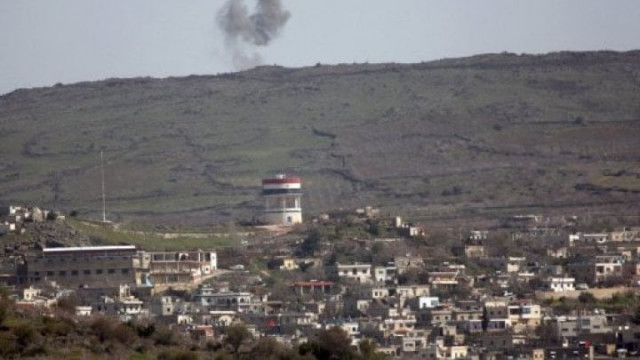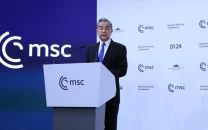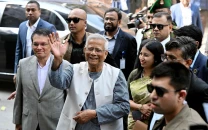Israeli strikes raise stakes in face-off with Hezbollah
On March 17, Israel struck a site near Palmyra, prompting Syria's army to retaliate

PHOTO: AFP
For most of the six-year-long conflict in Syria, Israel has stuck determinedly to the sidelines, not wanting to get sucked into the chaos unfolding to its northeast. While it is suspected of carrying out occasional attacks against minor targets, it has tended not to confirm or deny involvement. But it is determined to stop Lebanon's Hezbollah, with which it fought a 2006 war, and which it sees as the top strategic threat on its borders, from using its role in the Syrian war to gain weapons and experience that could ultimately endanger
Israel.
Since early in the conflict, the Shi'ite movement's energies
have been focused on propping up President Bashar al-Assad in
alliance with Iran and Russia, throwing thousands of its
fighters into battle against Syrian rebels. But although this strategy makes the prospect of a new war with Israel unwelcome to Hezbollah, it has not altered its view of the country as its foremost enemy, or stopped it strengthening its position for any new conflict. In the past six weeks, two Israeli attacks appear to have marked a shift, underscoring Israel's intent to squeeze Hezbollah and coming as the Trump administration carried out its own missile strikes in Syria.
Israel welcomes US airstrikes in Syria, will keep to sidelines
In both cases, Israeli officials have also been less guarded
about acknowledging who was behind the attacks. On March 17, Israel struck a site near Palmyra, prompting Syria's army to retaliate with Russian-supplied anti-aircraft missiles and on April 27th , it hit an arms depot in Damascus where Hezbollah was suspected of storing weapons supplied by Iran.
"The incident in Syria corresponds completely with Israel's
policy to act to prevent Iran's smuggling of advanced weapons
via Syria to Hezbollah," Intelligence Minister Israel Katz said
of the strike last week, but without explicitly confirming
Israel carried it out. Hezbollah has also bared its teeth, conducting a media tour along the Lebanon-Israel border that was widely interpreted as a message that it was unafraid of a new war, and hinting that any coming conflict might involve attacks on Israeli settlements.
A larger strike by Israel, or one that misses its target
with unintended consequences, might provoke an escalation,
further destabilising Syria and sucking Israel into an already
complex conflict. It's an outcome that neither Israel nor Hezbollah wants, but in a war that has already produced many unpredictable outcomes, it is not out of the question either.
Rules of the Game
Hezbollah is an Iranian-backed movement that was formed to
combat Israel's 1982-2000 occupation of Lebanon. Its battlefield
prowess, extensive social works among Lebanese Shi'ites and its
alliance with powerful regional states have helped it secure a
dominant role in the country's politics. Since the 2006 war with Israel, which killed more than 1,300 people, displaced a million in Lebanon and up to 500,000 in Israel, both sides have engaged in brinkmanship but avoided renewed conflict. Both say they do not want another war, but don't shy away from saying they are ready for one if it does end up happening.
Israel threatens to 'destroy' Syrian air defence systems
Last month, Hezbollah took Lebanese journalists on a tour of
the southern frontier with Israel, allowing pictures to be taken
of soldiers posing with weapons and staring across the border. Israel runs patrols along the same frontier, sends up drones and is constantly bolstering its defences. In March, Israeli minister Naftali Bennett, a hardliner, threatened to send Lebanon back to the Middle Ages if Hezbollah provoked another war.
An official in the military alliance that backs Assad said
Israel's recent air strikes had hit Hezbollah targets but played
down the damage done. As for retaliation, they drew a
distinction between Israel striking Hezbollah units deployed to
fight on behalf of Assad in Syria and those at home in Lebanon. "If Israel hits a Hezbollah convoy in Syria, Hezbollah will
decide if it will respond or not according to the circumstances
in Syria because, despite everything, Syria is a sovereign state
and Hezbollah cannot respond in a way that embarrasses the
regime," the official told Reuters on condition of anonymity.
"If Israel strikes Hezbollah in Lebanon, definitely it will
respond. If Hezbollah responds, what is the size of its response
that Israel can accept? This could mean an escalation to war. So
Israel avoids hitting Hezbollah convoys or rockets inside
Lebanon and prefers to strike it inside Syria."
Assad allies say US attack on Syria air base crosses 'red lines'
That analysis fits with how Israel broadly sees the
situation, too. Keeping any fallout from the war in Syria away
from its territorial interests is one thing. But going after
Hezbollah in Lebanon would be the trigger for renewed conflict. "A clash with Hezbollah is always an active possibility,"
said one Israeli diplomat.
While the enmity is fierce on either side, past experience
seems to have made both Hezbollah and Israel sharp analysts of
one another's positions and pressure points. "Sometimes there is a measured response which maintains the balance of deterrence and the rules of the game and sometimes there is a response which opens the door to escalation," said the official from the alliance backing Assad.
"Right now, the desire of both sides is to not get dragged
into a war or to open a new front, either in Golan or the south.
But at any moment events can develop and things can escalate
into war without either side wanting it."
Russia-Israel Axis
Russia - an ally of Hezbollah in the Syrian conflict but
which has also coordinated closely with Israel - has also taken
note of Israel's actions. For the past two years, Israel and Russia have coordinated closely on Syria, with Israeli Prime Minister Benjamin Netanyahu meeting face-to-face with Russian President Vladimir Putin and often speaking by phone to ensure there are no misunderstandings and that the risk of aerial confrontations is minimised.
For the most part, the system has worked, even if it
requires Israel to be delicate in balancing ties with the United
States and Russia at the same time. But the most recent
incidents appear to have angered Moscow.
Israel policeman fired for beating Palestinian driver
After the March strike, Russia summoned Israel's ambassador
for consultations, and after the Damascus airport attack the
foreign ministry issued a statement calling it unacceptable and
urging Israel to exercise restraint. "We consider that all countries should avoid any actions that lead to higher tensions in such a troubled region and call for Syrian sovereignty to be respected," Kremlin spokesman Dmitry Peskov told reporters.
A new war between Israel and Hezbollah could distract the
Shi'ite movement from its central role in the Syrian conflict,
thereby undermining a military campaign in which Russia has
staked great resources and prestige. Israeli analysts think Netanyahu's government must exercise caution.
"Israel still has to walk on eggshells and attack only
if the destruction of the target is vital and pertains directly
to Israeli security," military specialist Alex Fishman wrote in
Yedioth Ahronoth newspaper last week. Israeli ministers, several of whom have a Russian background, also appear determined to avoid provoking Moscow. "We'll do nothing fast and loose when it comes to the Russians," said the Israeli diplomat. "We'll be super-careful in Syria."



















COMMENTS
Comments are moderated and generally will be posted if they are on-topic and not abusive.
For more information, please see our Comments FAQ